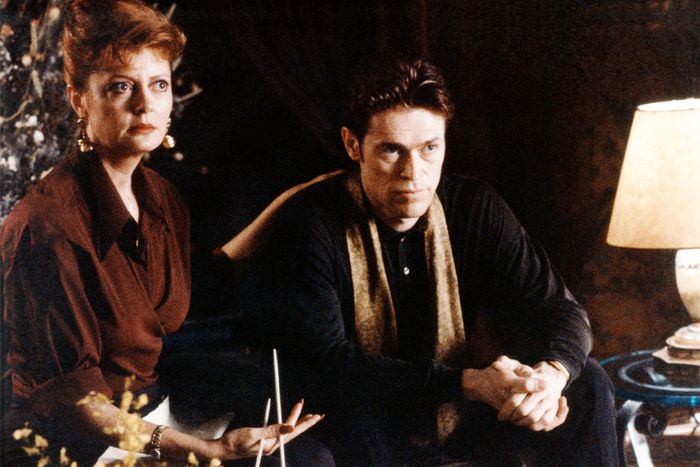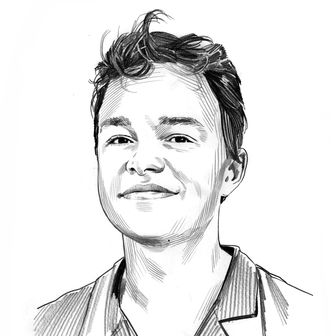
In 1992’s Light Sleeper, Willem Dafoe wanders the streets of New York like a ghost. As the 40-year-old drug dealer and recovering addict John LeTour, Dafoe — as paper white and sunken-eyed as he’s ever been — ducks in and out of random stores and high-rise apartment buildings, selling whatever drugs his rich clients ask him for. In between, he rides around Manhattan in the back of a car driven by a silent chauffeur, peering passively out the window at the city streets. When the night’s work is done, he returns to his drab, barely furnished apartment, opens a bottle of wine (the one drug he can’t quit), and scribbles his thoughts in a diary until he eventually falls into a fitful sleep.
In other words, he’s a Paul Schrader protagonist. By the early ’90s, the New Hollywood provocateur (and former film critic) had spent the better part of two decades bringing his intense character studies to the screen, whether as just a writer (Taxi Driver, Raging Bull) or as both writer and director (Blue Collar, Hardcore). With Light Sleeper, the former poet laureate of angry young men set out to explore his then-middle-aged anxieties, and he decided to do so through a character who never planned on making it to middle age to begin with. As a high-end drug dealer, LeTour is out of place in a young man’s game, having survived years of addiction only to emerge on the other side disoriented, incapable of imagining another life for himself. Everywhere he goes, there’s a distinct sense of faded glamour — the suggestion that this life was fun once when he was young. These days, his clients are tearing up their fancy apartments in drug-fueled spirals and the city seems to be rotting around him. (In an on-the-nose bit of place-setting, the film takes place during a garbage-workers’ strike, so steaming trash lines the sidewalks.) As he rides around in his car, separated from the world even as he moves through it, LeTour casts his thoughts almost exclusively toward the past.
Fittingly, Schrader positioned the movie as a reflection on his own past — and as the final entry in a loose trilogy of “man in a room” movies that began with Taxi Driver (1976) and American Gigolo (1980). “The character has gotten older as I’ve gotten older,” Schrader told Filmmaker Magazine after the release of Light Sleeper. “When he was in his 20s he was angry. When he was in his 30s he was narcissistic. Now he’s 40 and he’s anxious. I think that the times have changed similarly.”
That anxiety seeps into the movie in the form of an overwhelming melancholy. Far from the ticking time bomb that is Travis Bickle, LeTour is experiencing something more along the lines of a midlife crisis — a deep malaise that has him feeling like a passenger in his own life. He has no intricate plan to commit an act of violence; he doesn’t spend his time fuming over the filth of the world. As evidenced by his frequent check-ins with an unnervingly accurate psychic (played by Schrader’s wife, Mary Beth Hurt), LeTour is just a guy wandering about, hoping to stumble upon some form of spiritual release. Where Taxi Driver mirrors Travis’s psyche by hurtling toward inevitable violence and then resetting at the end, Light Sleeper meanders, content to unfold as a grimly beautiful mood piece, its tone shaped in equal parts by Michael Been’s schmaltzy, yearning soundtrack and Ed Lachman’s neon-heavy cinematography.
Nonetheless, a few plot threads emerge that eventually steer LeTour into a violent showdown. First, his New Age-y drug-dealing boss, Ann (Susan Sarandon), announces that she wants to leave the business behind and get into cosmetics — a plan that she swears is for real this time and that would upend LeTour’s life, forcing him to contemplate his future for once. He then has two run-ins with his ex, Marianne (Dana Delany), who worries that being around him will cause her to relapse. Undeterred by her not wanting to see him, LeTour takes their back-to-back run-ins as a sign from the universe that they’re meant to be together and starts to believe that he might be able to change after all. (“I am able to change,” he writes. “I can be a good person. What a strange thing to happen halfway through your life. What luck.”) Amid all this, LeTour has a series of increasingly troubling interactions with a German client named Tis Brüg (Victor Garber, achieving unprecedented levels of ham), who he learns is a suspect in the murder of a 19-year-old girl.
In classic Schraderian fashion, tragedy strikes, and LeTour finds himself in need of a gun. Where other Schrader protagonists, like Bickle or First Reformed’s Reverend Toller, wind themselves so tight that they come to view violence as a relief valve, LeTour glumly accepts that it may be his only path forward and has no grand expectations of what might come after. Schrader has called Light Sleeper one of his most personal films, so perhaps it’s no surprise that LeTour’s journey turns out to be one of personal growth — of learning to look forward to what his life could become rather than endlessly mulling over what it used to be. Before the end of the film’s runtime, LeTour manages to experience at least one moment of spiritual transcendence, which (no spoilers) may or may not invoke the ending to Robert Bresson’s Pickpocket, easily the film with the most outsize impact on Schrader’s filmography.
When Light Sleeper was released, critics predictably noted that Schrader was returning to familiar ground, with Roger Ebert going so far as to write, “In film after film, for year after year, Paul Schrader has been telling this story in one way or another, but never with more humanity than this time.” In continuing to mine the same vein, Ebert argues, Schrader had managed to dig up something new — perhaps something that he couldn’t have accessed as a younger man.
Thirty-one years later, Schrader has completed a second loose trilogy of “man in a room” movies with the recently released Master Gardener, which follows First Reformed (2018) and The Card Counter (2021). When I saw Master Gardener at the New York Film Festival last year, a bit of knowing laughter rippled through the audience when the film opened with a shot of Joel Edgerton sitting at a desk, scribbling in his journal. There was comfort in knowing that Schrader was still up to his old tricks and that he might once again manage to excavate something new. By the time the credits rolled after the film’s gentle, romantic parting shot, I was convinced that he had.


